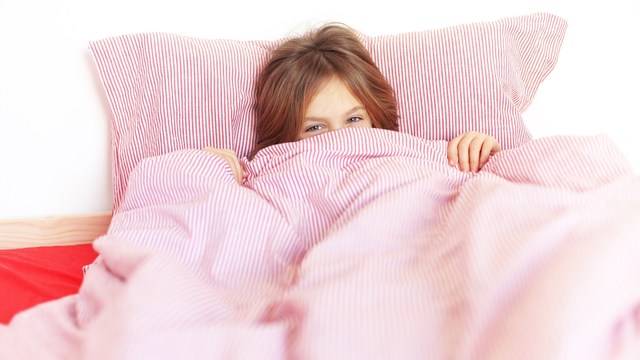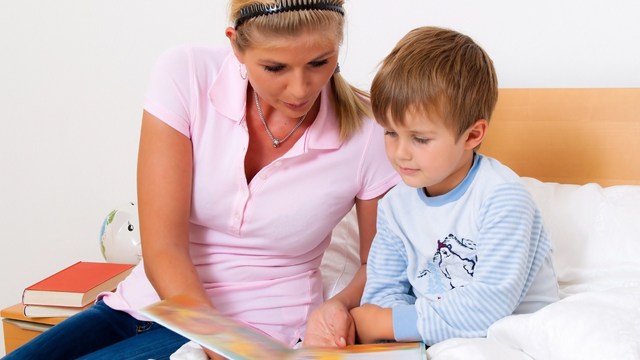 Alena Ozerova/PhotoSpin
Alena Ozerova/PhotoSpin
What is Enuresis?
According to WebMD, “[n]octurnal enuresis, or bed-wetting…is the most common type of elimination disorder. Daytime wetting is called diurnal enuresis. Some children experience either or a combination of both.”
The Canadian Pediatric Society defined primary nocturnal enuresis or bed-wetting as “the involuntary discharge of urine at night by children old enough to be expected to have bladder control….”
The CPS said further that parents should view involuntary bedwetting as a variation in the development of normal bladder control. A child is considered to have secondary enuresis if he/she has experienced a minimum six-month period of continence before the onset of the bedwetting. (4)
The International Children’s Continence Society uses the term enuresis only when it applies to nighttime wetting in children over 5 years of age, and only if a child experiences more than two wetting episodes per week. (1, 2, 5)
Factors that may contribute to enuresis include :
• A small bladder
• Persistent urinary tract infections
• Severe stress or anxiety
• Developmental delays that interfere with toilet training
• Genetics
• Heavy sleep habits
How Common is Nocturnal Enuresis?
Dr. C. Carolyn Thiedke of the Medical University of South Carolina said that nocturnal enuresis affects an estimated 5-7 million children in the United States and occurs three times more often in boys than in girls.
She said, “At five years of age, 15 to 25 percent of children wet the bed. With each year of maturity, the percentage of bed-wetters declines by 15 percent. Hence, 8 percent of 12-year-old boys and 4 percent of 12-year-old girls are enuretic; only 1 to 3 percent of adolescents are still wetting their bed.”
Enuresis can have a significant effect on a child’s self-esteem. She may be punished or chewed out by her parents. She may be afraid to talk about it with her friends for fear of being ridiculed, or simply think poorly of herself for doing something so “baby-like”.
In fact, Dr. William Lane Robson, medical director of the Children’s Clinic warned, “Children with enuresis are commonly punished and are at significant risk of emotional and physical abuse. Numerous studies report feelings of embarrassment and anxiety in children with enuresis; loss of self-esteem; and effects on self-perception, interpersonal relationships, quality of life, and school performance.” (5)
How can Enuresis or Nocturnal Enuresis be Treated
The difficulty with any treatment is balancing the fact that wetting the bed is nothing to be ashamed of with the reward and praise that comes with dry nights.
Treatment may include:
Alarm devices which go off when the child starts to urinate when sleeping. The hope is that eventually the child will start to recognize the sign of a full bladder and the need to go to the bathroom while asleep and wake up without assistance.
Desmopressin acetate is a synthetic analogue of antidiuretic hormone (ADH) which reduces the overnight production of urine.
The Canadian Pediatric Society warns that desmopressin acetate should only be used as a short-term treatment, such as in the event of attending camp or a sleep over, and shouldn’t be used as a cure.
Imipramine hydrochloride is an antidepressant that has been shown to be effective in reducing bedwetting. However, it has a high relapse rate when the medication is discontinued. (5) It is not clear why this medication works or what precise effect it has on enuresis. (2)
Behavioral therapy may include reward systems or waking a child to urinate, called “lifting” or dry bed training, and must avoid punishments and humiliation. (2)
Some quick tips for conquering bedwetting include:
• “Clarify the goal of getting up at night and using the toilet.”
• “Assure the child’s access to the toilet.”
• “Avoid caffeine-containing foods and excessive fluids before bedtime.”
• “Have the child empty the bladder at bedtime.”
• “Take the child out of diapers (training pants may be acceptable).”
• “Include the child in morning cleanup in a nonpunitive manner.”
• “Preserve the child’s self-esteem.”
• “Children for whom primary nocturnal enuresis is not distressing should not receive treatment …” (2)
• “Children should drink well during the day to maintain hydration and avoid feeling thirsty when they get home from school ...” (5)
Sources:
1. Nocturnal Enuresis. Thiedke, C. Carolyn. American Academy of Family Physicians. Am Fam Physician. 2003 Apr 1;67(7):1499-1506. Web. Apr 1, 2013.
http://www.aafp.org/afp/2003/0401/p1499.html
2. Management of primary nocturnal enuresis. Feldman, M. Canadian Paediatric Society. Paediatr Child Health 2005;10(10):611-4. Web. Apr 1, 2013.
http://www.cps.ca/en/documents/position/primary-nocturnal-enuresis
3. Enuresis in Children. WebMD. Web. Apr 1, 2013.
http://www.webmd.com/mental-health/enuresis
4. Bedwetting (Nocturnal Enuresis). KidsHealth.org. Web. Apr 1, 2013.
http://kidshealth.org/teen/diseases_conditions/urinary/enuresis.html#
5. Enuresis. Robson, Wm Lane M, et. al. Medscape.com. Web. Apr 1, 2013.
http://emedicine.medscape.com/article/1014762-overview#a0104
Reviewed April 2, 2013
by Michele Blacksberg RN
Edited by Jody Smith




Add a Comment2 Comments
Although many young children wet their beds, most stop by the time they are 4 or 5 years old. Bed-wetting that persists can lead to embarrassment and teasing by peers. If your child is 6 or 7 and still can't stay dry through the night, you should consider speaking to a doctor about bed-wetting treatment. One treatment that helps many children is a bed-wetting alarm.
www.drybuddy.com
January 8, 2014 - 8:21amThis Comment
Thank you, Mike.
I actually wrote an article on bedwetting for older children. My research said bedwetting is quite common up to about age 7 and that prior to age 7, parents shouldn't really be all that concerned and that most times treatment isn't required.
January 14, 2014 - 12:03pmThis Comment